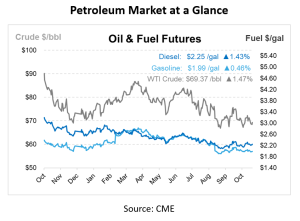
9 Must-Dos for Winter-Proofing Your DEF
With winter around the corner, fleet owners and operators have a lot on their minds. One of the important considerations is how to manage Diesel Exhaust Fluid (DEF) during the colder months. DEF plays a crucial role in reducing emissions in diesel vehicles, and while it’s a straightforward product, winter temperatures can affect how it behaves.
DEF freezes at around 12 degrees Fahrenheit, which can create challenges during colder weather. While freezing doesn’t compromise the quality of the fluid, it can disrupt your ability to use it effectively.
What happens when DEF freezes?
DEF is made mostly of water, with the other part being urea (around 32%). Therefore, like water, DEF freezes when exposed to low temperatures. When DEF freezes, it expands by about 7%. While this expansion won’t affect the fluid’s quality, it can potentially damage storage tanks if they’re completely full.
Additionally, if the DEF in your storage container is frozen solid, you may find it challenging to transfer it to your vehicle, leading to operational delays. If DEF freezes in your vehicle’s tank, there’s no immediate cause for concern. The Selective Catalytic Reduction (SCR) system is equipped with a heating element that will quickly thaw the DEF, allowing it to return to a usable state.

Strategies for Handling DEF in Winter
- Store Indoors – Whenever possible, keep DEF in a temperature-controlled environment to prevent freezing. Indoor storage helps protect against temperature extremes and maintains the fluid’s quality.
- Choose the Right Container – Use containers made of HDPE plastic or stainless steel for long-term storage. These materials resist corrosion and help prevent contamination, ensuring the integrity of the DEF.
- Leave Room for Expansion – Always ensure that your DEF tank is not completely full. Allowing space for expansion will help avoid cracking of the storage basin during freezing conditions.
- Seal DEF Containers – Make sure all containers are sealed and airtight. This prevents evaporation, which can lead to the formation of crystalline material and compromise the quality of the fluid.
- Invest in Heating Solutions – For extreme cold, consider using a 110v heater blanket around your storage tanks. This additional protection can help maintain a consistent temperature and prevent freezing.
- Manage Delivery and Use – The fluid in the delivery hose is more susceptible to freezing than that in the storage tank. If the hose freezes, detach it and bring it into a warmer environment until it thaws.
- Avoid Additives – Resist the temptation to add solutions to DEF to raise its freezing point. Maintaining the purity of DEF is essential for its proper functioning in the SCR system.
- Consider Built-in Heating Features – When selecting storage tanks, explore options that come with built-in heating elements. These solutions can provide added protection against freezing. Talk to your DEF or FS&S supplier to check out the options they offered.
- Keep DEF away from sunlight – It might seem like a good idea to warm DEF in the sun, but the urea in the formulation is particularly sensitive to sunlight and high temperatures. When exposed to direct sunlight, DEF can start to decompose and lose its effectiveness. To avoid this issue, follow our first tip and always store your DEF indoors!
Searching for a High-Quality DEF for your Fleet? Look no further!
Mansfield Energy understands the importance of protecting your fleet assets. Today’s high-tech diesel engines are expensive. Using poor quality, off-spec DEF can increase fuel consumption, equipment downtime, and maintenance expenses. Mansfield ensures customers always have a reliable supply of high-quality DEF that consistently meets ISO standards.
With our extensive network of DEF distribution partners combined with our own dedicated assets, Mansfield offers unmatched DEF logistics to ensure you always have the DEF you need. Contact us today!

This article is part of Daily Market News & Insights
Tagged: Daily Market News & Insights, DEF, diesel, gasoline, U.S., winterize fuel
MARKET CONDITION REPORT - DISCLAIMER
The information contained herein is derived from sources believed to be reliable; however, this information is not guaranteed as to its accuracy or completeness. Furthermore, no responsibility is assumed for use of this material and no express or implied warranties or guarantees are made. This material and any view or comment expressed herein are provided for informational purposes only and should not be construed in any way as an inducement or recommendation to buy or sell products, commodity futures or options contracts.





